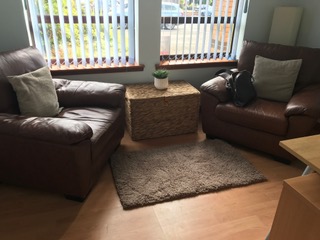It is actually quite a complex thing, and every individual will experience anxiety uniquely. Sometimes, anxiety can mean having repetitive thoughts and worries that make us feel uneasy, out of control, as if a whirlwind of doubt has descended upon us.
The more we try to block out these thoughts the more they tend to dominate our minds and we can feel that we are in a real inner struggle. Sometimes, anxiety can mean physical restlessness; being compelled to do the housework, the gardening, surfing the internet, anything other than sitting still – anxiety simply can feel like a whirlwind of activity. Like jumping off safely from a galloping horse, it can feel overwhelming to try and stop ourselves from physically doing things. Anxiety can also involve panic attacks. Our hearts can beat quickly and we may feel like we are hyperventilating; we may feel we are in danger and about to collapse. Anxiety can involve deep-rooted feelings of dread and fear – feelings that can be evoked by the thought of going to work, answering emails, performing well in an exam.
A therapist can explore what anxiety means to a particular person, how they cope or not, what situations, people, places may trigger anxiety. A therapist can also provide strategies to cope with the triggers to anxiety. If we try to do nothing but fight against our anxiety, this can make it worse. The more we try to battle against it, the more we dislike what it does to us, and the more potentially we can dislike ourselves.
If we can come to accept that anxiety has played an important evolutionary role in humans, that it is part of our structure, this can somehow enable us to be more tolerant and this tolerance reduces anxiety. Of course, we can then also draw upon various therapeutic techniques to further make peace with anxiety.
It’s not really surprising that anxiety is one of the most common reasons people come to counselling. Anxiety and stress are ever-increasing problems in our modern world of multi-tasking, to-do lists and the constant juggle of the work/life balance. We’re simply not designed to do so many things at once.
Counselling is an excellent way to treat anxiety. Speaking to a trained professional can help you identify the underlying issues that are causing your symptoms.
Anxiety is used to describe feelings of worry, fear and unease. Typically, it incorporates both the emotional and physical sensations we experience when worried or nervous. Anxiety is related to the ‘fight or flight’ response and, while unpleasant, this is a normal reaction when our body perceives a threat.
We will all feel anxious at some time and it’s very common to feel tense or unsure about a potentially stressful situation, such as an exam, starting a new job, or moving home. However, some of us will be affected more than others. Despite being a normal experience, if these feelings are very strong or are lasting a long time, it can be overwhelming.
What is anxiety?
Anxiety can make you imagine things are worse than they are and prevent you from carrying out everyday tasks, or even leaving the house. Where stress is something that will come and go, anxiety can affect a person even if the cause is unclear.
When under stress, our ‘fight or flight’ response will turn on. This acts as an internal alarm system, designed to protect us from danger in the wild. These days, we can recognise this system through the ‘butterflies in the stomach’ we feel when we’re nervous. Anxiety, however, may cause this response to activating at inappropriate moments. You may feel this during normal, non-threatening situations.
Anxiety UK describes anxiety like a bucket of water;
‘If we keep adding stressors to the bucket (even tiny ones, like the school run or commuting to work), over time it fills up until one day it overflows.’
This can be a good way of looking at anxiety as it explains why sometimes it can seem to come out of the blue, with no significant trigger.
While some will know what causes their anxiety; after experiencing a traumatic event, for example, others will not have such an identifiable reason. Not knowing the cause of anxiety can sometimes cause a person to experience further distress – if they don’t know the trigger, how can they overcome it?
When is the right time to seek help?
Anxiety is a problem that can get worse if the stressors continue to build up. People may feel ashamed to ask for help, or believe that it’s not ‘that big a problem’ thus covering their feelings and dealing with it alone. It’s important to know that you deserve support and as lonely as you feel, people care. If you’re not comfortable talking to a loved one, there are many other platforms available. Online support groups and anxiety counselling give you the opportunity to talk to people who understand you.
Anxiety disorders
Common anxiety disorders include:
Generalised anxiety disorder – If you often feel anxious or fearful, but not anxious about a specific event or experience, you may be diagnosed with GAD. Typically, these feelings are related to everyday tasks, such as stress at home or work, but other times you may not know why you are feeling anxious.
Phobias – A phobia is an intense fear of something – no matter how dangerous or threatening it may be to you. Coming into close contact with the feared situation may cause you to feel anxious. In some cases, even the thought of said situation can trigger anxiety.
Panic disorder – If you experience seemingly unpredictable panic attacks, and are unable to identify a trigger, you may be diagnosed with panic disorder. Symptoms include shortness of breath, feeling faint and trembling.
Obsessive compulsive disorder (OCD) – OCD comprises of obsessional thoughts followed by compulsive urges. The obsessions are recurring urges, thoughts or images that can cause you to feel anxious. Compulsions are the actions or thoughts that you feel the need to do or repeat. Compulsions are typically a response to ease the anxiety of an obsession.





